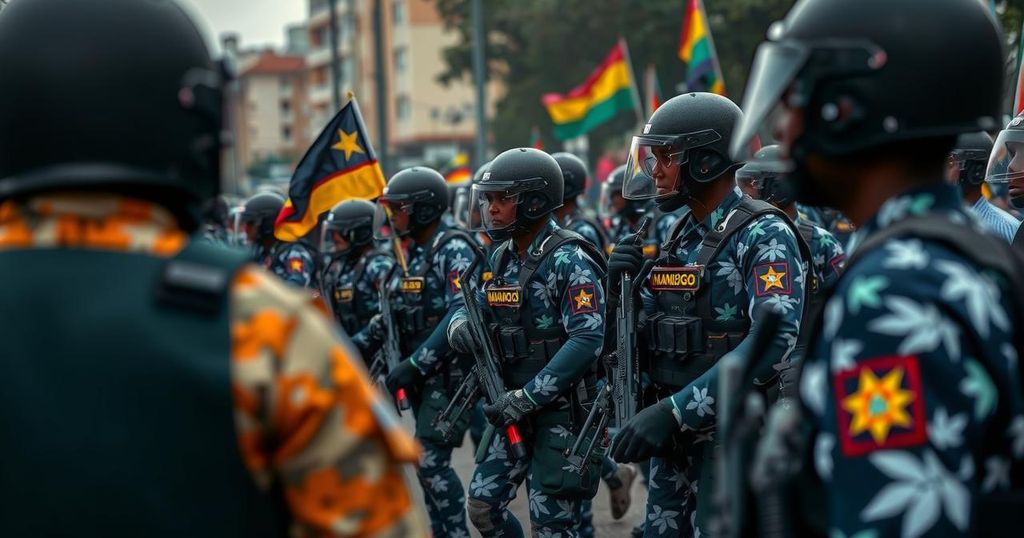World news
AFRICA, ANTONIO, ANTONIO JUAQIM, BBC, COMMISSION, DANIEL CHAPO, DEMOCRACY, ELECTIONS, FR, FRELIMO, MANUEL SAMUEL, MAPUTO, MON, MONDLANE, MOZAMBIQUE, OPPOSITION, PROTESTS, RENAMO, SAMUEL, SAO FRANCISCO XAVIER, SÃO FRANCISCO XAVIER CEMETERY, VE, VENÂNCIO MONDLANE, VIOLENCE
Ethan Kim
0 Comments
Tragic Violence Erupts Amid Protests in Mozambique’s Electoral Crisis
Mozambique is experiencing a crisis following the recent presidential election, marked by widespread protests against the electoral victory of the ruling Frelimo party. The death of 16-year-old Antonio Juaqim, among others, during police confrontations has drawn public outcry against violent repression of dissent. The situation reflects deep-rooted frustrations among citizens, particularly the youth, regarding economic issues and political representation.
In Mozambique, a nation grappling with the aftermath of its recent presidential election, tragic incidents have unfolded during opposition-organized protests. A 16-year-old boy named Antonio Juaqim was killed by police while participating in a pot-banging demonstration against the election results, which favored the ruling Frelimo party. His death reflects the escalating tensions in a country where dissent has been met with violence. Witnesses and family members report a concerning pattern of police brutality, particularly towards the youth, with campaign group Human Rights Watch estimating that approximately 40 individuals have lost their lives during the protests, including at least ten children.
The protests initially emerged following the electoral commission’s declaration that Frelimo’s Daniel Chapo secured 71% of the votes, a claim contested by his closest rival, Venâncio Mondlane. Mondlane, who alleged electoral fraud and subsequently fled the country, incited supporters to express their discontent through nightly demonstrations, creating a wave of civil unrest. Antonio’s experiences echo the grief shared among families mourning the senseless loss of young lives amid a political crisis.
As citizens continue to demonstrate, many are opting for quieter protests from their homes, banging pots and pans at 21:00 nightly, signifying widespread disillusionment with the government. This situation has drawn criticism from various commentators, including political party leaders and civil rights organizations, who argue against the excessive use of force demonstrated by law enforcement. The civil strife serving as a reminder of the urgent need for governmental accountability and respect for human rights in Mozambique.
The current political turmoil in Mozambique has roots in dissatisfaction with long-standing ruling party Frelimo, which has been in power since independence nearly five decades ago. Recent elections have been surrounded by allegations of corruption and electoral fraud, leading to a significant public backlash. The opposition movement has been propelled by a call for change, particularly among younger generations who seek economic opportunities and reject the reigning political status quo. The recent protests illustrate a growing frustration with police responses to dissent, particularly concerning the tragic deaths of young demonstrators, which have highlighted the severity of the political climate.
The unfolding events in Mozambique underscore the critical need for dialogue and reform within the political landscape. The tragic loss of life among young protesters signifies a breaking point for many citizens who are eager for change and justice. With accusations of police brutality and the ongoing struggle for voices to be heard, the situation continues to deteriorate, posing significant challenges for the government and the future trajectory of Mozambique’s democracy. The international community must remain vigilant and advocate for the protection of human rights in this crisis.
Original Source: www.bbc.com




Post Comment